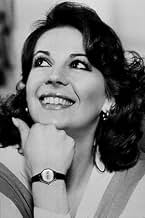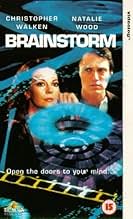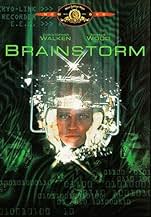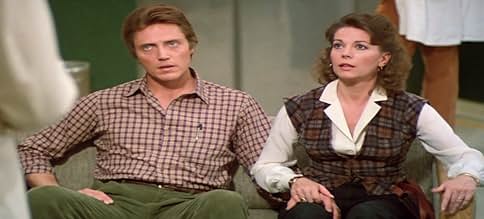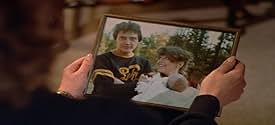Brainstorm
- 1983
- Tous publics
- 1h 46m
IMDb RATING
6.4/10
14K
YOUR RATING
Researchers develop a system where they can jump into people's minds. But when people involved bring their personal problems into the equation, it becomes dangerous - perhaps deadly.Researchers develop a system where they can jump into people's minds. But when people involved bring their personal problems into the equation, it becomes dangerous - perhaps deadly.Researchers develop a system where they can jump into people's minds. But when people involved bring their personal problems into the equation, it becomes dangerous - perhaps deadly.
- Director
- Writers
- Stars
- Awards
- 2 wins & 6 nominations total
Ira David Wood III
- Barry
- (as David Wood)
Mary Fran Lyman
- Realtor
- (as Mary-Fran Lyman)
- Director
- Writers
- All cast & crew
- Production, box office & more at IMDbPro
Featured reviews
The first and last time I saw this movie was back in 1983 and I've wanted to watch it again many times since then. I just couldnt remember the title , until someone here on IMDB reminded me.
I used to explain the plot to the guys at video rental places, and they would just stare at me as though I had gone nuts......
I then recently saw Flatliners and felt the urge to watch Brainstorm again.....so I did..... and I found it just as good as when I first saw it.
Of course there are a few bad points, but it is the idea behind the movie and the way it is projected that leaves you .......feeling......and thats rare for a movie these days.
If you're tired of the usual stuff being churned out by Hollywood, watch Brainstorm.........you wont see anything like it.
I used to explain the plot to the guys at video rental places, and they would just stare at me as though I had gone nuts......
I then recently saw Flatliners and felt the urge to watch Brainstorm again.....so I did..... and I found it just as good as when I first saw it.
Of course there are a few bad points, but it is the idea behind the movie and the way it is projected that leaves you .......feeling......and thats rare for a movie these days.
If you're tired of the usual stuff being churned out by Hollywood, watch Brainstorm.........you wont see anything like it.
Anybody notice certain similarities 'twixt this film and the movie "Strange Days"? In that movie they have perfected a memory-recording device that can be played back on small tapes. Is "Brainstorm" so forgotten that nobody else has made the connection?
"Strange Days" was heralded for its originality, but some of us know better. People who are addicted to the tapes in "Strange Days" are called "tapeheads". I'd like to ask John Cusack and Tim Robbins if they think *that's* original.
"Strange Days" was heralded for its originality, but some of us know better. People who are addicted to the tapes in "Strange Days" are called "tapeheads". I'd like to ask John Cusack and Tim Robbins if they think *that's* original.
Everyone knows this was Natalie Wood's last film, and that some of her scenes were filmed after her death with a stand-in you only see from behind. Director Donald Trumball, best known for his special effects work in Blade Runner, Close Enounters, and Star Trek, chose this time to build his story on plot and character development, a good choice given the enormous talent he had to work with. Trumball's battle with studio execs to finish the film after Wood's death, rather than claim the insurance proceeds and call the film off, ended his career in Hollywood, but assured that this gem would not be lost. It is somewhat ironic that Natalie's swan song should be a sci-fi movie, since she was hardly known for work in the genre, but she brings a grace and charm, as well as depth and beauty, to the genre that is usually lacking.
Most sci-fi films based on technology don't age well, and there are times where this is no exception. The idea of recording on tape, let alone making tape loops, must seem like wax cylinder recordings to today's MP3 generation. The tapes themselves were props borrowed from a film being shot nearby, and that film was itself a dismal failure. But the concept is timeless, and so well done that, all in all, the film still works as well as it did in 1983.
Lesser screenplays would have been content with the main story line; scientists invent a way to record brainwaves and play them back for a real life out of body experience, and for just such a stinker, check out Strange Days. But then along comes the incomparable, utterly fabulous Louise Fletcher, who, as one of the co-inventors of the aforementioned device, records her death when she suffers a heart attack while working late one night. For the rest of the film, people are either trying to play the tape or prevent others from playing it. Meanwhile, the technology gets hijacked by two-dimensional government lackeys trying to exploit the weapons potential of the invention.
One can easily pick out scenes of this movie to vilify or exalt, all these years later, and any object viewed over time eventually has a vanishing point. The almost slapstick scene where the assembly robots go berserk is one example of a scene that, while consistent with its contemporaries, is silly today. The death scene, though much maligned, is equally misunderstood, and provides the metaphysical underpinnings that elevate Brainstorm above mere gadget flicks. Brainstorm is about exploring experience, life, love, even death, from the point of view of others, and Academy Award winner Louise Fletcher allows us to do so through her consummate skill in presenting a death scene of sufficient awe and wonder to warrant exploration.
If you want to find out what else happens, watch the film, but when you do, don't ignore the beautiful, delicate interplay between Christopher Walken and Natalie Wood. Their careening relationship seems somehow tied to the invention they helped make, and there are sequences so beautiful that I sometimes take out the DVD just to marvel at them.
Despite changing styles in special effects, this is a timeless and beautiful story that transcends the genre and, with Walken, Wood and Fletcher, becomes more than just a story about shiny gold tapes that record brain waves. It's more about immovable objects and irresistible forces and what happens when they collide. Intrigued? Good. Go watch it.
Most sci-fi films based on technology don't age well, and there are times where this is no exception. The idea of recording on tape, let alone making tape loops, must seem like wax cylinder recordings to today's MP3 generation. The tapes themselves were props borrowed from a film being shot nearby, and that film was itself a dismal failure. But the concept is timeless, and so well done that, all in all, the film still works as well as it did in 1983.
Lesser screenplays would have been content with the main story line; scientists invent a way to record brainwaves and play them back for a real life out of body experience, and for just such a stinker, check out Strange Days. But then along comes the incomparable, utterly fabulous Louise Fletcher, who, as one of the co-inventors of the aforementioned device, records her death when she suffers a heart attack while working late one night. For the rest of the film, people are either trying to play the tape or prevent others from playing it. Meanwhile, the technology gets hijacked by two-dimensional government lackeys trying to exploit the weapons potential of the invention.
One can easily pick out scenes of this movie to vilify or exalt, all these years later, and any object viewed over time eventually has a vanishing point. The almost slapstick scene where the assembly robots go berserk is one example of a scene that, while consistent with its contemporaries, is silly today. The death scene, though much maligned, is equally misunderstood, and provides the metaphysical underpinnings that elevate Brainstorm above mere gadget flicks. Brainstorm is about exploring experience, life, love, even death, from the point of view of others, and Academy Award winner Louise Fletcher allows us to do so through her consummate skill in presenting a death scene of sufficient awe and wonder to warrant exploration.
If you want to find out what else happens, watch the film, but when you do, don't ignore the beautiful, delicate interplay between Christopher Walken and Natalie Wood. Their careening relationship seems somehow tied to the invention they helped make, and there are sequences so beautiful that I sometimes take out the DVD just to marvel at them.
Despite changing styles in special effects, this is a timeless and beautiful story that transcends the genre and, with Walken, Wood and Fletcher, becomes more than just a story about shiny gold tapes that record brain waves. It's more about immovable objects and irresistible forces and what happens when they collide. Intrigued? Good. Go watch it.
First off, let's get a few things out of the way:
Yes, "Brainstorm" is marred by uneven acting and the death of its lead actress, Natalie Wood, under circumstances that to this day are still the stuff of speculation.
Yes, Louise Fletcher's death scene is overacted to the point of parody.
Yes, it's not easy to accept Christoper Walken in a role of a semi-normal person.
Yes, "Brainstorm" was only Douglas Trumbull's second film as a director, and some might argue that it was little better than "Silent Running."
But, even despite all of that, the story is incredibly engaging, the visuals are striking (what else would you expect from the wizard responsible for "2001" and "Blade Runner"?), James Horner's music is absolutely divine, and the film is quite enjoyable.
Also, in its favor, a great deal of the credit (or blame, as many would say) for the final result lies squarely with MGM/UA. Still dealing with United Artists' financial baggage after their merger, the company all but took the film away from Trumbull after Wood's death--not to mention the studio's lack of support for Trumbull's plan to film the "helmet" sequences in his ultra-realistic Showscan process.
So, in point, I highly recommend this movie, but just be aware of what you're getting into...
Yes, "Brainstorm" is marred by uneven acting and the death of its lead actress, Natalie Wood, under circumstances that to this day are still the stuff of speculation.
Yes, Louise Fletcher's death scene is overacted to the point of parody.
Yes, it's not easy to accept Christoper Walken in a role of a semi-normal person.
Yes, "Brainstorm" was only Douglas Trumbull's second film as a director, and some might argue that it was little better than "Silent Running."
But, even despite all of that, the story is incredibly engaging, the visuals are striking (what else would you expect from the wizard responsible for "2001" and "Blade Runner"?), James Horner's music is absolutely divine, and the film is quite enjoyable.
Also, in its favor, a great deal of the credit (or blame, as many would say) for the final result lies squarely with MGM/UA. Still dealing with United Artists' financial baggage after their merger, the company all but took the film away from Trumbull after Wood's death--not to mention the studio's lack of support for Trumbull's plan to film the "helmet" sequences in his ultra-realistic Showscan process.
So, in point, I highly recommend this movie, but just be aware of what you're getting into...
Douglas Trumbull's early attempt at depicting Virtual Reality in a film is a mixed affair, but remains fascinating. Its solid cast and good production values are somewhat let down by the muddled script and inexperienced direction (this was to be Trumbull's second - and final, Directing gig).
The film is caught in odd Catch 22 - much of its technology has been both long since been surpassed (the Mylar tape & laser show!), and, in other areas, not reached yet - true emotions and sensations transmitted via VR. As expected from Trumbull, the special effects are solid if not as spectacular as his work on 2001, BLADE RUNNER and CLOSE ENCOUNTERS. Originally conceived as a feature film test for his high frame rate Showscan process, Trumbull had to settle for 70mm and a wider aspect ratio for it's VR scenes. There is no question that true Showscan would have made for a more impressive visual experience, even if only in limited locations.
Douglas Trumbull is one of cinema's true visionaries, but a smooth accomplished Director he wasn't. As in SILENT RUNNING, the ideas and visuals outstrip his ability to do them full justice. Still, BRAINSTORM has more solid ideas than 99% of SF films even attempt. The film's love for Science, from the gadgets to the photos of Einstein, to the self-sacrifice of the wonderful Louise Fletcher, this is a movie that celebrates the world of knowledge. And, damn, Christopher Walken that off-the-wall even then!!?? Sadly, poor Natalie Wood looked very tired (her death during filming cast a pall over its release). Cliff Robertson is decent as the head of the experimental lab. Still, it is Fletcher who becomes the heart and literal soul of the production. Her Lillian Reynolds is an exceptional depiction of the dedicated scientist who lets no obstacle get in the way of her pursuits. It is because of Fletcher and the film's concepts that makes the film endure, whatever its flaws.
The film is caught in odd Catch 22 - much of its technology has been both long since been surpassed (the Mylar tape & laser show!), and, in other areas, not reached yet - true emotions and sensations transmitted via VR. As expected from Trumbull, the special effects are solid if not as spectacular as his work on 2001, BLADE RUNNER and CLOSE ENCOUNTERS. Originally conceived as a feature film test for his high frame rate Showscan process, Trumbull had to settle for 70mm and a wider aspect ratio for it's VR scenes. There is no question that true Showscan would have made for a more impressive visual experience, even if only in limited locations.
Douglas Trumbull is one of cinema's true visionaries, but a smooth accomplished Director he wasn't. As in SILENT RUNNING, the ideas and visuals outstrip his ability to do them full justice. Still, BRAINSTORM has more solid ideas than 99% of SF films even attempt. The film's love for Science, from the gadgets to the photos of Einstein, to the self-sacrifice of the wonderful Louise Fletcher, this is a movie that celebrates the world of knowledge. And, damn, Christopher Walken that off-the-wall even then!!?? Sadly, poor Natalie Wood looked very tired (her death during filming cast a pall over its release). Cliff Robertson is decent as the head of the experimental lab. Still, it is Fletcher who becomes the heart and literal soul of the production. Her Lillian Reynolds is an exceptional depiction of the dedicated scientist who lets no obstacle get in the way of her pursuits. It is because of Fletcher and the film's concepts that makes the film endure, whatever its flaws.
Did you know
- TriviaBecause of the immensely troubled production and disagreements with MGM, Douglas Trumbull opted never to direct a Hollywood film again. In 1983 he stated, "I have no interest . . . in doing another Hollywood feature film . . . Absolutely none. The movie business is so totally screwed-up that I just don't have the energy to invest three or four years in a feature film. Moviemaking is like waging war. It destroys your personal life, too. The people who can survive the process of making films have largely given up their personal lives in order to do that, just because it's such a battle to make a movie. And in doing that, they've isolated themselves from the very audience that they're trying to reach."
- GoofsSeveral of the tapes play back from a third-person perspective, which would be impossible if the tapes were actually a person's recorded memory.
- Quotes
Dr. Michael Anthony Brace: I made that for you. It's a gift.
[hands her the tape and sets the large silver metal case on the bed]
Karen Brace: What is it?
Dr. Michael Anthony Brace: It's me.
- Crazy creditsAfter the final credit has rolled, 'TO NATALIE' appears for a couple seconds
- Alternate versionsIn the psychotic episode sequence when Michael's (Christopher Walken) son Chris (Jason Lively) wears the headset, there's a slight difference between the 70mm version and 35mm version. In the 70mm version of Chris's hallucination when Michael flips a lever presumably sending an electrical current to Chris's head, the camera cuts to and remains on a shot of a circular device with electricity running through it, as Michael is heard to say, 'Now you're gonna find out it's mine!' In the 35mm version, the shot arrangement is the same except that it cuts back to a closeup of Michael saying the line 'Now you're gonna find out it's mine!'
- ConnectionsEdited into Trumbull Land (2018)
Details
- Release date
- Country of origin
- Language
- Also known as
- Proyecto Brainstorm
- Filming locations
- Research Triangle Park, North Carolina, USA(Burroughs Wellcome Pharmaceutical Corporation HQ)
- Production companies
- See more company credits at IMDbPro
Box office
- Budget
- $15,000,000 (estimated)
- Gross US & Canada
- $10,219,460
- Opening weekend US & Canada
- $1,196,965
- Oct 2, 1983
- Gross worldwide
- $10,219,460
- Runtime
- 1h 46m(106 min)
- Color
Contribute to this page
Suggest an edit or add missing content


